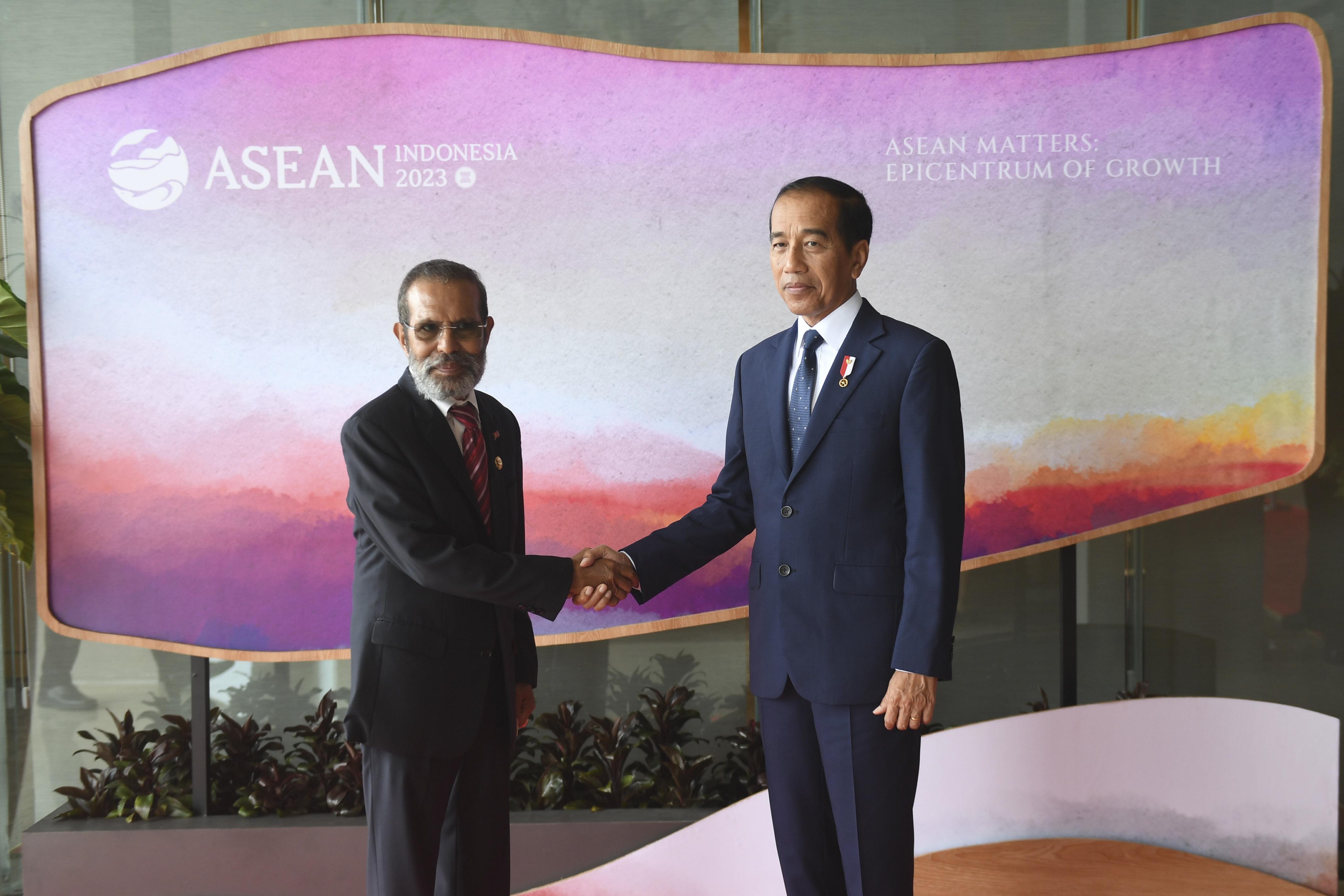 Indonesian President Joko Widodo (right) shakes hands with East Timor's Prime Minister Taur Matan Ruak during their bilateral meeting ahead of the 42nd ASEAN Summit in Labuan Bajo, East Nusa Tenggara, Indonesia, May 9, 2023. (PHOTO / POOL / AP)
Indonesian President Joko Widodo (right) shakes hands with East Timor's Prime Minister Taur Matan Ruak during their bilateral meeting ahead of the 42nd ASEAN Summit in Labuan Bajo, East Nusa Tenggara, Indonesia, May 9, 2023. (PHOTO / POOL / AP)
Indonesia will fully support Timor-Leste's membership in the Association of Southeast Asian Nations and has committed to investing in the country, a senior official said on Tuesday.
Foreign ministers of Brunei, Cambodia, Laos, Malaysia, the Philippines, Singapore, Thailand and Vietnam attended the meeting chaired by Indonesian Foreign Minister Retno Marsudi in the final preparations for the two-day summit of the ASEAN leaders.
Marsudi said Indonesian President Joko Widodo welcomed Timor-Leste's Prime Minister Taur Matan Ruak to the ASEAN summit for the first time.
Indonesian Foreign Minister Retno Marsudi said in the briefing that Indonesian President Joko Widodo stressed the importance of economic cooperation between Timor-Leste and Indonesia. Widodo said the two sides need to create a bilateral investment treaty and to complete negotiations on land borders
Marsudi said in the briefing that Widodo stressed the importance of economic cooperation between Timor-Leste and Indonesia. Widodo said the two sides need to create a bilateral investment treaty and to complete negotiations on land borders.
Timor-Leste's Ruak thanked Indonesia's support for the country's bid to join the regional bloc.
The association agreed in principle to admit Timor-Leste as its 11th member in November 2022.
Before the closed-door meeting began, Marsudi stressed ASEAN is currently at a crossroads, with multiple challenges including food and energy crises and global economic slowdown testing its strength as a community.
She urged actions against transnational crimes ranging from terrorism and money laundering to drugs and human trafficking, which she said not only threaten peace, stability and prosperity in the region but also hinder the process of community development.
The summit, under Indonesia's ASEAN chairmanship this year, is themed "ASEAN Matters: Epicentrum of Growth". Indonesia has expressed hopes that the bloc will remain a center of regional and global growth, laying focus on efforts to make ASEAN a fast-growing, inclusive and sustainable economic region in the long term.
Among the issues top on the agenda are ASEAN centrality, financial stability and green growth.
READ MORE: ASEAN agrees in principle to admit Timor-Leste as 11th member
Indonesia, this year's rotating chair of the Leaders of the Association of Southeast Asian Nations, is hosting the first of the biannual summit at Labuan Bajo in the Nusa Tenggara region.
Marsudi said Widodo has likewise met with other ASEAN leaders. Widodo and Vietnamese Prime Minister Pham Minh Chinh's meeting focused on efforts to boost bilateral trade to reach $15 billion by 2028. Both sides agreed to sign a bilateral investment treaty, cooperate in the renewable energy sector and sign a pact on the marine and fisheries industry.
Malaysian Prime Minister Anwar Ibrahim has again invited Widodo to visit his country. Widodo said they need to discuss the importance of the sea and land borders between the two countries and the protection of Indonesian migrant workers in Malaysia.
Widodo and Lao President Thongloun Sisoulith discussed cooperation between Indonesia's power company Perusahaan Listrik Negara and Laos' Electricite du Laos, procurement of airplanes from Indonesia's Dirgantara Indonesia for the Lao Air Force, and procurement of trains from Indonesia's Industri Kereta Api for the Petrotrade Lao Public Company.
ALSO READ: ASEAN stepping up push for treaty on nuclear weapon-free zone
Earlier this year, various ministerial meetings were held on topics around the theme of this year's ASEAN summit.
At the end of March, the meeting of finance ministers and central bank governors agreed to reinforce the use of local currencies in the region and reduce reliance on major international currencies in an effort to ensure financial stability and avoid spillovers such as high inflation from global crises.
Xinhua contributed to this story.
Leonardus Jegho is a freelance journalist for China Daily.


